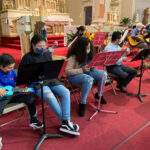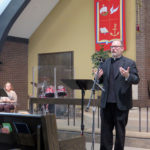By Sarah Adams
Gray Space Graces

Social media. It brings us great opportunity to connect with strangers around the world as well as family and friends who may not be geographically close to us for whatever reason. It gives us access to information at an amazing speed. It allows us to hear stories we wouldn’t hear without it. Yet, social media also brings with it, danger. It can easily become a distraction from in-person experiences, it can desensitize us to the suffering of others and it can easily confine us to echo chambers where we rarely hear conflicting views from our own. So, with both opportunities and dangers, how can we best use social media in a healthy and productive way? Can our Christian experience bring anything to the table? What does the Church have to say about it?
On May 28, 2023, the Vatican Dicastery for Communication released a document entitled, “Towards Full Presence: A Pastoral Reflection on Engagement with Social Media.” A few exciting things about this document to note: one, it is one of the few documents coming from the Vatican signed by a lay person (Paolo Ruffini, the prefect of the Dicastery for Communication), and two, it’s also one of the first treatments of social media that has come from the Vatican that explores the shortcomings and strengths of social media. Historically, in Vatican documents, social media has been painted with broad strokes. This text, Towards Full Presence (hereafter, TFP), gives an honest assessment of the digital world. It recognizes that social media offers great opportunity for the Church to meet others and form relationships and also that there are many dangers to avoid online.
The text coins the term, “onlife,” which speaks to the reality of our world today in which there is not a clear distinction between our online and offline lives. They are interwoven. Social media is the new public square. It opens a new question for us to reflect on that we are presented in this document: who is my neighbor? As we become more connected in non-physical spaces, borders become blurry and we find that we are not as far from others as we may think. Social media affords us the opportunity to have conversations with and listen to those we wouldn’t otherwise listen to in our physical day-to-day life.
For example, recently I was curious about how people my age (I’m 25) felt about religion and faith, so I posed the question on my Instagram: how do you feel about faith or religion at this point in your life? I got a wide variety of responses — from, “Annoyed, frustrated, and disconnected” to “faith — overwhelmed and joyful. Religion — angry and not interested” to “grateful” to “I like the meaning and purpose it gives me in life” to “confused” to “I’ve definitely developed a greater appreciation for it but have also really enjoyed challenging and exploring the ways in which religion has failed different groups of people.” All of these answers I received gave me the opportunity to start honest and vulnerable conversations with people I wouldn’t have dialogued with otherwise. Without social media, that would not have been possible.
TFP recognizes those opportunities that we have on social media to build relationships and communities. It reminds us to never forget that those we meet online are real people. They have hopes, dreams and hurts. All of our social media interactions should be based in recognizing that the people we are connecting with are also God’s children. TFP discusses the danger that social media presents in creating “filter bubbles” or groups of like-minded people, which is good in some cases. However, when we only see people online who agree with us, it exacerbates polarization and can lead to extremist ideals and behavior.
TFP calls for all Christians to act in “God’s style” on social media. Pope Francis has often referred to God’s style throughout his papacy and he defines it as “closest compassion and tenderness.” This document is optimistic that we can make a change in the culture of social media. In fact, the Vatican has already launched an initiative called #FullyPresent that calls for all of us to use social media in a way that forms relationships and communities of belonging. Imagine an online world in which everyone treated those they encountered with compassion and tenderness. Imagine the culture of love that could create. How might we, as individuals and communities, begin acting on social media with these dreams in mind?
(Sarah Adams is social media coordinator for the Diocese of Davenport.)











